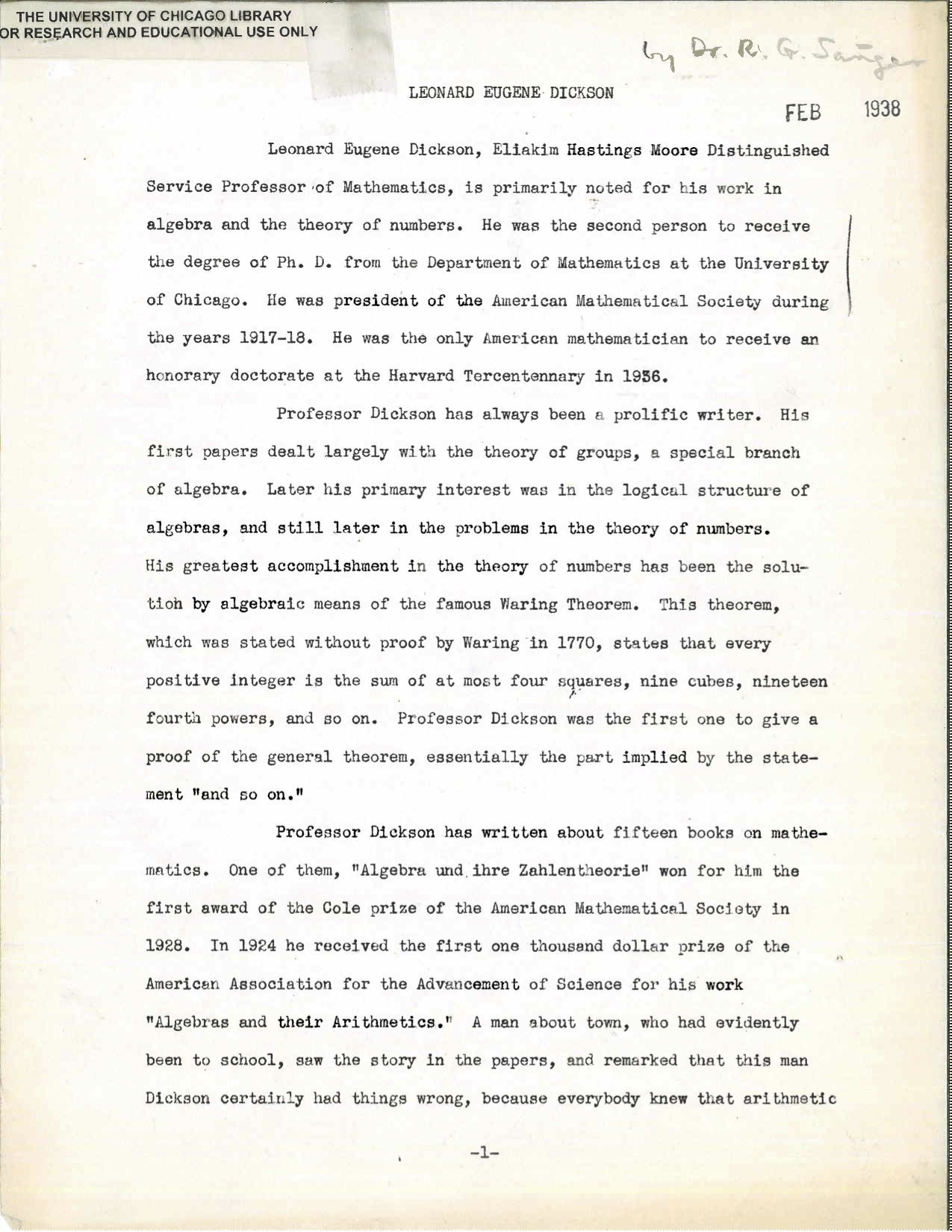by R. G. Sanger

Leonard Eugene Dickson, Eliakim Hastings Moore Distinguished Service Professor of Mathematics, is primarily noted for his work in algebra and the theory of numbers. He was the second person to receive the degree of Ph.D. from the Department of Mathematics at the University of Chicago. He was president of the American Mathematical Society during the years 1917–18. He was the only American mathematician to receive an honorary doctorate at the Harvard Tercentennary in 1936.
Professor Dickson has always been a prolific writer. His first papers dealt largely with the theory of groups, a special branch of algebra. Later his primary interest was in the logical structure of algebras, and still later in the problems in the theory of numbers. His greatest accomplishment in the theory of numbers has been the solution by algebraic means of the famous Waring Theorem. This theorem, which was stated without proof by Waring in 1770, states that every positive integer is the sum of at most four squares, nine cubes, nineteen fourth powers, and so on. Professor Dickson was the first one to give a proof of the general theorem, essentially the part implied by the statement “and so on.”
Professor Dickson has written about fifteen books on mathematics. One of them, “Algebra und ihre Zahlentheorie” won for him the first award of the Cole prize of the American Mathematical Society in 1928. In 1924 he received the first one thousand dollar prize of the American Association for the Advancement of Science for his work “Algebras and their Arithmetics.” A man about town, who had evidently been to school, saw the story in the papers, mid remarked that this man Dickson certainly had things wrong, because everybody knew that arithmetic came before algebra. His book on the “History of the Theory of Numbers,” a huge three volume work, is monumental compendium of all that had been done in that field up to the date of its publication, 1919. His other texts include works which vary from an elementary trigonometry to books on the latest intricasies and developments in algebra and the theory of numbers. Lately, on being asked for a list of his publications, he vehemently replied that there were a few hundred of them and how was he expected to recall the names of all of them.
In 1900 Professor Dickson was added to the staff of the Department of Mathematics at the University of Chicago. Before then he taught at the University of Texas and the University of California. He had also spent a year abroad, studying at Leipzig and Paris. At that time, it was the conventional thing for a man going into educational work to spend some time abroad, and Professor Dickson followed the traditional lines, greatly to his profit.
While at the University of Leipzig, Professor Dickson studied under Sophus Lie. When the time came to leave Leipzig, Dickson was in a quandary as how to announce this fact to Lie, since Lie felt that the only German university of importance was the one at Leipzig, and that one was wasting his time if he studied elsewhere in Germany. However, Professor Dickson broached the subject to Lie finally, and stated that he was going to Paris for a while before returning home. Lie immediately congratulated him on his plans, praised the University of Paris, and told him that he should have left for Paris earlier.
As a teacher, Professor Dickson could be inspiring to those who wanted to learn mathematics. He had no patience with poor mathematics, or with one who would use such mathematics. Most of the students stood in perpetual awe of him, for he was in the habit of hurling anathemas at those, both students and others, whose mathematics was at all weak. No matter how stinging were the remarks made concerning an individual, nothing personal was ever meant. Professor Dickson was assailing the mathematics, not the individual, and was likely as not as soon as the period was over, to speak in an entirely friendly mood to the person on some non-mathematical question.
One day in one of his classes a girl asked Professor Dickson to explain a passage in one of his texts, implying that the book was not clearly written. For the whole class hour he commented violently on those who could not understand clear mathematics. The next day the girl had the audacity to repeat the same question with the same implications. Again the hour was spent in a tirade, Professor Dickson’s voice rising to meet the situation. On the third day, when the same question opened the hour, Professor Dickson admitted that there might be two interpretations for the passage, stated which one was correct, and the class proceeded as usual. This upheaval was undoubtedly due to the fact that the text, one of Dickson’s books, was very concisely written, all excess material (and much that was superfluous to him was not to the poor student) being promptly deleted.
In the days before I knew him, Professor Dickson is reported to have played a good game of tennis. At present, his main avocations consist in reading mystery stories and in playing bridge. He is an ardent advocate of the game of bridge, is consistently a conservative player, and believes that it is his personal misfortune to hold so many bad cards. The tales concerning his bridge game are numerous, the special terminology which he uses is unconventional in the extreme, and his comments on and to his partners and opponents of such a nature that they frequently mentally consign him to the region known as Hades.
In the years that I have known Professor Dickson he appears to have mellowed. He does not erupt in the venomous tirades as frequently as he used to, and as a consequence has lost some of the horrible glamour which he used to appear to possess. His zeal and interest in mathematics, however, remains unchanged.